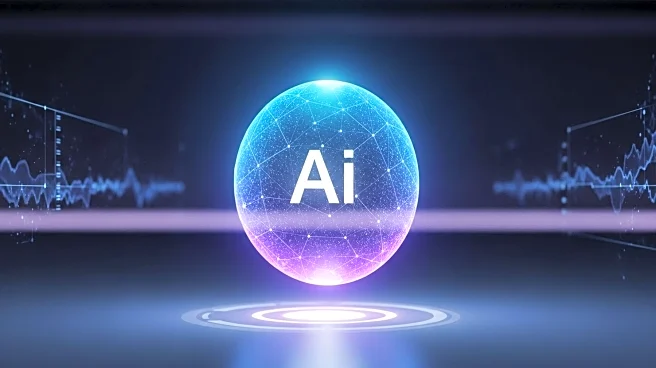What is the story about?
What's Happening?
OpenAI, a leading artificial intelligence company, has reached a valuation of $500 billion following a secondary stock sale. This development positions OpenAI as potentially the world's most valuable startup, surpassing companies like SpaceX and ByteDance. The stock sale involved current and former employees selling $6.6 billion in shares to investors such as Thrive Capital, Dragoneer Investment Group, T. Rowe Price, SoftBank, and MGX from the United Arab Emirates. Despite this high valuation, OpenAI has yet to turn a profit, which raises concerns about a potential AI bubble if the company's generative AI products do not meet investor expectations. CEO Sam Altman has addressed these concerns, emphasizing the long-term potential of AI technology to drive economic growth and scientific breakthroughs.
Why It's Important?
The valuation of OpenAI at $500 billion underscores the significant expectations placed on AI technology to transform industries and drive economic growth. This development highlights the intense interest and investment in AI, as companies and investors seek to capitalize on its potential. However, the lack of profitability raises questions about the sustainability of such high valuations and the risk of an AI bubble. If OpenAI and similar companies fail to deliver on their promises, it could lead to financial losses for investors and a reevaluation of AI's role in the economy. The situation also reflects broader trends in the tech industry, where companies are valued based on future potential rather than current earnings.
What's Next?
OpenAI's future steps include continuing to develop its AI technologies and expanding its business ventures. The company recently launched partnerships with Etsy and Shopify for AI-driven online shopping and introduced a social media app for AI-generated videos. OpenAI is also working on a data center venture with Oracle and SoftBank and has reduced its reliance on Microsoft. Additionally, OpenAI plans to offer $50 million in funding for nonprofit projects that enhance public understanding of AI and increase economic opportunities. These initiatives indicate OpenAI's commitment to advancing AI technology while addressing regulatory scrutiny and maintaining its nonprofit mission.
Beyond the Headlines
The rapid valuation increase of OpenAI raises ethical and regulatory questions about the role of AI in society. As AI technologies become more integrated into daily life, concerns about data privacy, algorithmic bias, and the impact on employment are likely to intensify. OpenAI's partnerships and corporate structure changes may attract further scrutiny from regulators, particularly regarding its adherence to its nonprofit mission. The company's efforts to balance profit motives with its charitable purpose will be closely watched by industry observers and policymakers.
















